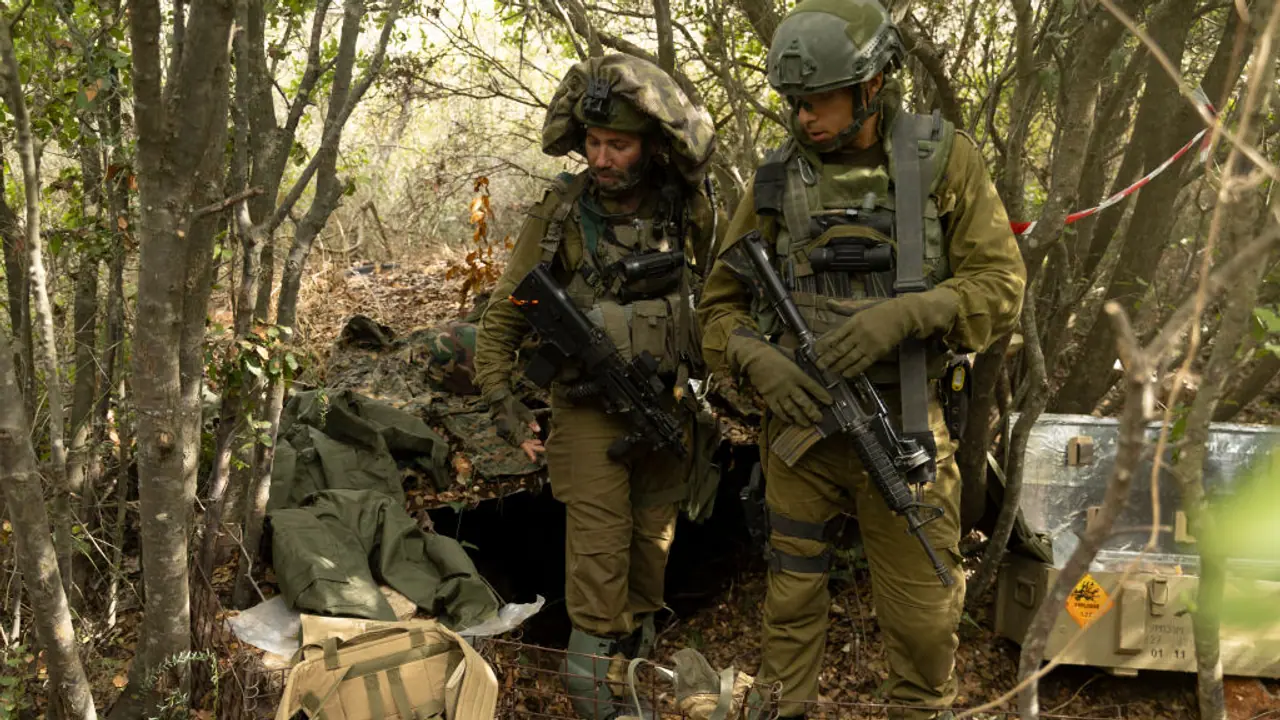Israeli military forces operating in southern Lebanon have reportedly discovered a substantial and surprising cache of sophisticated Russian weaponry in the possession of Hezbollah.
Israeli military forces operating in southern Lebanon have reportedly discovered a substantial and surprising cache of sophisticated Russian weaponry in the possession of Hezbollah, the Iran-backed militant group that has long been engaged in conflict with Israel. The weapons, including advanced Kornet antitank missiles, were reportedly transferred from Russian stockpiles in Syria, marking a significant escalation in Hezbollah's military capabilities. The quantity and sophistication of the weapons found reportedly far exceeded Israel's prior expectations, prompting concerns about the growing alliance between Russia and Hezbollah.

According to The Wall Street Journal, Israeli troops have uncovered large numbers of modern, Russian-made weapons, some as recent as 2020, that have substantially bolstered Hezbollah’s ability to target and kill Israeli soldiers. These discoveries, including advanced antitank missiles such as Kornet, Metis, and Konkurs systems, were said to be found in both underground and above-ground Hezbollah bunkers just inside southern Lebanon.
A senior Israeli military officer was quoted as saying that approximately 60% to 70% of the weapons seized in the early days of Israel’s invasion were of Russian origin.
The presence of such advanced weaponry underscores a significant shift in Hezbollah’s arsenal, which was previously thought to be limited to older, less sophisticated Russian arms dating back to the Soviet era. The Kornet missiles, in particular, have proven highly effective against Israeli forces, allowing Hezbollah to engage targets from long distances, even up to 8 kilometers. These weapons have been instrumental in numerous deadly attacks against Israeli soldiers, with Israel reporting severe casualties due to these missile strikes.
Russia's role in Middle East
Israel had long suspected that Hezbollah was receiving support from Russia, especially through its ally Syria, which has been a major recipient of Russian arms for years. Russian military involvement in Syria has strengthened over the years, particularly since the Syrian Civil War began in 2011, when Russia intervened to support President Bashar al-Assad’s regime. As a result, Russian weapons reportedly have found their way into Hezbollah's hands through Syria's military infrastructure, where Russia maintains extensive stockpiles.
The nature of Russia’s relationship with Hezbollah, however, remains contentious. While Moscow has repeatedly claimed it does not take sides in the Israel-Hezbollah conflict, its growing cooperation with both Syria and Iran has raised alarms in Israel. In addition to providing weapons, Russia has allegedly hosted top Hamas leaders in Moscow since the October 7 attack on Israel, further complicating Israel's foreign policy in the region.
Israel's strategy and concern
Israel's primary objective in its ongoing ground operation in southern Lebanon is to neutralize Hezbollah’s ability to launch missile attacks across the border and to prevent the militant group from rearming. The discovery of such large quantities of Russian weaponry has intensified fears that Hezbollah is becoming more powerful, posing a greater threat to Israeli security.
The Israeli government has expressed concerns that Russia may be further deepening its ties with Hezbollah, especially as Moscow becomes more engaged in Middle Eastern geopolitics.
Arkady Mil-Man, a former Israeli ambassador to Russia, emphasized that Israel must now take a stronger stance, warning that any support for Hezbollah and Iran that endangers Israeli lives must be countered decisively. Mil-Man argued that Israel should pressure Russia to prevent further weapons smuggling to Hezbollah.
“Israel needs to be more assertive and defend its interests,” he was quoted as saying in the WSJ report. “We must explain and convey to the Russians that we will no longer stand any assistance to Hezbollah and Iran that could hurt Israelis."
Tensions between Israel and Russia
While Israel has historically sought to maintain diplomatic relations with Russia, particularly to ensure cooperation in Syria and to avoid escalating tensions in the region, the dynamics have shifted significantly since Russia’s invasion of Ukraine in 2022. Israel's careful stance toward Russia’s actions in the Middle East has faced increasing scrutiny, especially as Moscow has strengthened its alliance with Iran and its support for groups hostile to Israel.
Some Israeli analysts are now questioning the country’s policy of engaging with Russia, which they argue is no longer viable given Moscow’s direct and indirect support for groups like Hezbollah and Hamas.
“We need to sober up from this approach,” Carmit Valensi, a senior researcher at the Institute for National Security Studies, a Tel Aviv-based think tank, was quoted as saying in the WSJ report. “It’s no longer just Russian support for the axis of resistance that is unconnected to Israel. We are meeting this in the battlefield and it is extracting casualties.”
The weapons and their impact
The Russian-made Kornet missiles found in southern Lebanon are reportedly among the most advanced antitank weapons in Hezbollah's arsenal. These missiles are said to have been used effectively against Israeli tanks and personnel since the October 7 attacks. Their precise targeting and long-range capability have reportedly made them one of the most potent threats to Israeli forces. Hezbollah has also allegedly employed these missiles in videos showing successful attacks, with experts noting that their use represents a significant shift in the group’s ability to conduct high-impact operations.
Israel’s ongoing military operation in Lebanon has already claimed the lives of 43 Israeli soldiers, and the risks continue to mount as Hezbollah's weaponry proves to be a formidable challenge. The situation highlights the complex dynamics of regional alliances, with Russia’s increasing involvement in Syria and its support for anti-Israeli factions placing Israel in a precarious position.
